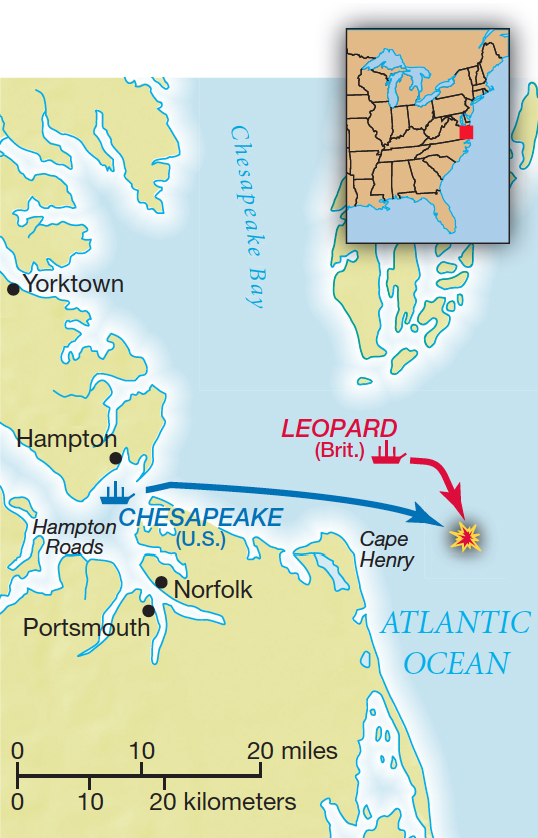Impressment and Embargo.
Printed Page 254 Chapter Chronology
Impressment and Embargo. In 1803, France and Britain went to war, and both repeatedly warned the United States not to ship arms to the other. Britain acted on these threats in 1806, stopping U.S. ships to inspect cargoes for military aid to France and seizing suspected deserters from the British navy, along with many Americans. Ultimately, 2,500 U.S. sailors were "impressed" (taken by force) by the British, who needed them for their war with France. In retaliation against the impressment of American sailors, Jefferson convinced Congress to pass a nonimportation law banning certain British-made goods.
impressment
A British naval practice of seizing sailors on American ships under the claim they were deserters from the British navy. Some 2,500 British and American men were taken by force into service, a grievance that helped propel the United States to declare war on Britain.

Jefferson found one event particularly provoking. In June 1807, the American ship Chesapeake, harboring some British deserters, was ordered to stop by the British frigate Leopard. The Chesapeake refused, and the Leopard opened fire, killing three Americans — right at the mouth of the Chesapeake Bay, well within U.S. territory. In response, Congress passed the Embargo Act of 1807, prohibiting U.S. ships from traveling to all foreign ports, a measure that brought a swift halt to all overseas trade carried in American vessels. Though a drastic measure, the embargo was meant to forestall war by forcing concessions from the British through economic pressure.
Embargo Act of 1807
Act of Congress that prohibited U.S. ships from traveling to foreign ports and effectively banned overseas trade in an attempt to deter Britain from halting U.S. ships at sea. The embargo caused grave hardships for Americans engaged in overseas commerce.
The Embargo Act of 1807 was a disaster. From 1790 to 1807, U.S. exports had increased fivefold, but the embargo brought commerce to a standstill. In New England, the heart of the shipping industry, unemployment rose. Grain plummeted in value, river traffic halted, tobacco rotted in the South, and cotton went unpicked. Protest petitions flooded Washington. The federal government suffered, too, for import duties were a significant source of revenue. The Federalist Party, in danger of fading away after its weak showing in the election of 1804, began to revive.
Secretary of State James Madison was chosen by Republican caucuses — informal political groups that orchestrated the selection of candidates. The Federalist caucuses again chose Pinckney. Madison won, but Pinckney secured 47 electoral votes, nearly half of Madison's total. Support for the Federalists remained centered in New England, and Republicans still held the balance of power nationwide.